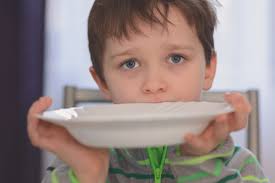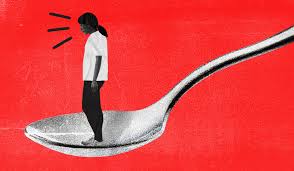As parents, it is our innate and primary role to provide proper nutrition for our children. We are hard wired to feed our offspring. If this very natural process is in any way disrupted, as parents, we are stricken and cannot help but take it personally. For it is our job to keep our children well fed. So when our children don’t eat well, eat too much or too little, fight us about healthy food choices, collect food in their rooms and other trauma responses, we, as parents are unnerved.
 Now imagine what it may have been like for your adopted child when they were a baby. Perhaps they were not fed consistently. Perhaps they went to sleep as an infant or toddler hungry. Over and over again. Maybe as a toddler, food was not always available and sometimes there was food and other times there just wasn’t. Maybe as a 4 year old, your adopted child had to get their own food as their caregiver was not doing this crucial parenting task. Maybe they even had to care for their younger sibling’s hunger needs. Perhaps food was provided but your precious child’s safety was not. Maybe they ate their meals listening to their parents yelling at each other. Maybe they feared for their safety during these screaming matches while they were told to be quiet and eat their supper. Most likely they worried that they too were going to get yelled at or worse. This trauma creates a very real, complicated, and often unhealthy relationship with all things food.
Now imagine what it may have been like for your adopted child when they were a baby. Perhaps they were not fed consistently. Perhaps they went to sleep as an infant or toddler hungry. Over and over again. Maybe as a toddler, food was not always available and sometimes there was food and other times there just wasn’t. Maybe as a 4 year old, your adopted child had to get their own food as their caregiver was not doing this crucial parenting task. Maybe they even had to care for their younger sibling’s hunger needs. Perhaps food was provided but your precious child’s safety was not. Maybe they ate their meals listening to their parents yelling at each other. Maybe they feared for their safety during these screaming matches while they were told to be quiet and eat their supper. Most likely they worried that they too were going to get yelled at or worse. This trauma creates a very real, complicated, and often unhealthy relationship with all things food.
Most of the families that I work with have children who have come from hard places. Places full of trauma. These hard places almost always include a scenario like those described above. And most times, worse. So it is no wonder then that most of the children in the families I support have some real food issues. And these issue in turn almost always affect the parent’s intrinsic need to feed their children. But what gets lost in the shuffle is the misunderstanding on the adult’s part. I hear time and time again, but they have enough food now WITH US so why are they overeating, hoarding, eating so fast, and so worried they won’t have enough to eat?
The problem is that your child’s body may not know that. They may still be in the panic mode of hunger and fear. Please take a moment to understand that your child’s odd relationship with eating and food is connected to their past, their trauma, and not to your competence as a parent. Once you buy into this idea, you can change how you react to your child and THAT is where change can really occur. That is how you can help your child to heal. You have to shift your perspective to help your child to create new, healthier habits based on the present home with you, not on the ghosts of their past. If you can change how you think and act, you can help your children and to slowly teach their bodies that food is present and they don’t have to worry anymore about going to sleep hungry.
For real-life strategies, don’t forget to read this article.





